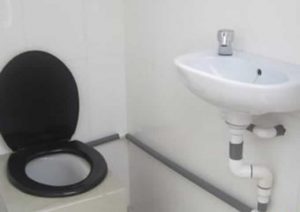“Visualize a 9-year-old girl who wakes up in the middle of the night to attend to nature’s call and has to walk to a public toilet outside of her compound or to a nearby bush. Imagine the possible dangers and the inconvenience”.
World Toilet Day is celebrated annually on 19 November to inspire action to tackle the global situation crisis and help achieve Sustainable Development Goal 6 (SDG 6), which seeks to promote clean water and sanitation for all by 2030. This year’s theme on World Toilet Day is about ˝Valuing toilets˝. The campaign attracts attention to the issues that continue to plague the water, sanitation and hygiene (WASH) menace in the world. It highlights the fact that toilets and the sanitation systems that support them are underfunded, poorly managed, or neglected in many parts of the world. These issues subsequently give rise to devastating consequences to health, the economy and the environment, particularly in the poorest and most marginalized communities.
In sub-Saharan Africa, limited access to basic sanitation coupled with high population growth has led to an increase in open defecation. This intermittently results in the spread of deadly diseases such as cholera and typhoid fever. The situation in Ghana is no different, the World Bank estimates that poor sanitation and hygiene leads to $290 million in economic losses for Ghana each year. Also, about 5.7 million people are forced to relieve themselves in the open, according to the World Health Organization. According to Water and Sanitation for the Urban Poor (WSUP), nearly half the population in Kumasi rely on public toilets, with only one toilet for every 1,000 people. Water services in low-income urban areas are often non-existent. This is having a massive knock-on effect on the population’s health, dignity, and economic growth.

The effects of poor sanitation management reflect in many aspects of the lives of Ghanaians. The risks posed by open defecation and improper disposal of faecal matter in the sea and other water sources is unsustainable and detrimental to healthy living. Open defecation and improper disposal of faecal matter contributes to the cyclical cholera outbreak which causes unwarranted deaths. The social cost attributable to open defecation include loss of dignity and privacy, risk of physical attack, and sexual violence against girls and other vulnerable groups when accessing sanitation facilities that are not within close proximity.

The adoption of cheap and environmentally friendly toilets will reduce the spread of the cholera. The micro-flush toilet is an environmentally friendly, low cost, odourless and fly-free toilet that reuses a small amount (1 cup) of greywater (all waste water generated from households or offices without faecal contamination) from a previous user’s hand wash to isolate waste and flush the toilet. Proper faecal management can result in the production of manure for agriculture. Additionally, sanitation inequity should be addressed through specific strategies to address the sanitation needs of the poorest. Open defecation not only has higher costs than any other sanitation practise, it has considerable adverse social impacts. Low cost and effective ways of stopping open defecation need to be scaled up.
CERATH Development Organization amongst its areas of intervention is promoting affordable and sustainable access to water, health and sanitation (WASH). CDO is also committed to promoting best practices in the WASH sector, supporting countries in Africa to achieve open defecation-free communities, and promoting innovative technologies and approaches targeted at increasing access to water and improving access to toilet facilities, and waste management.




